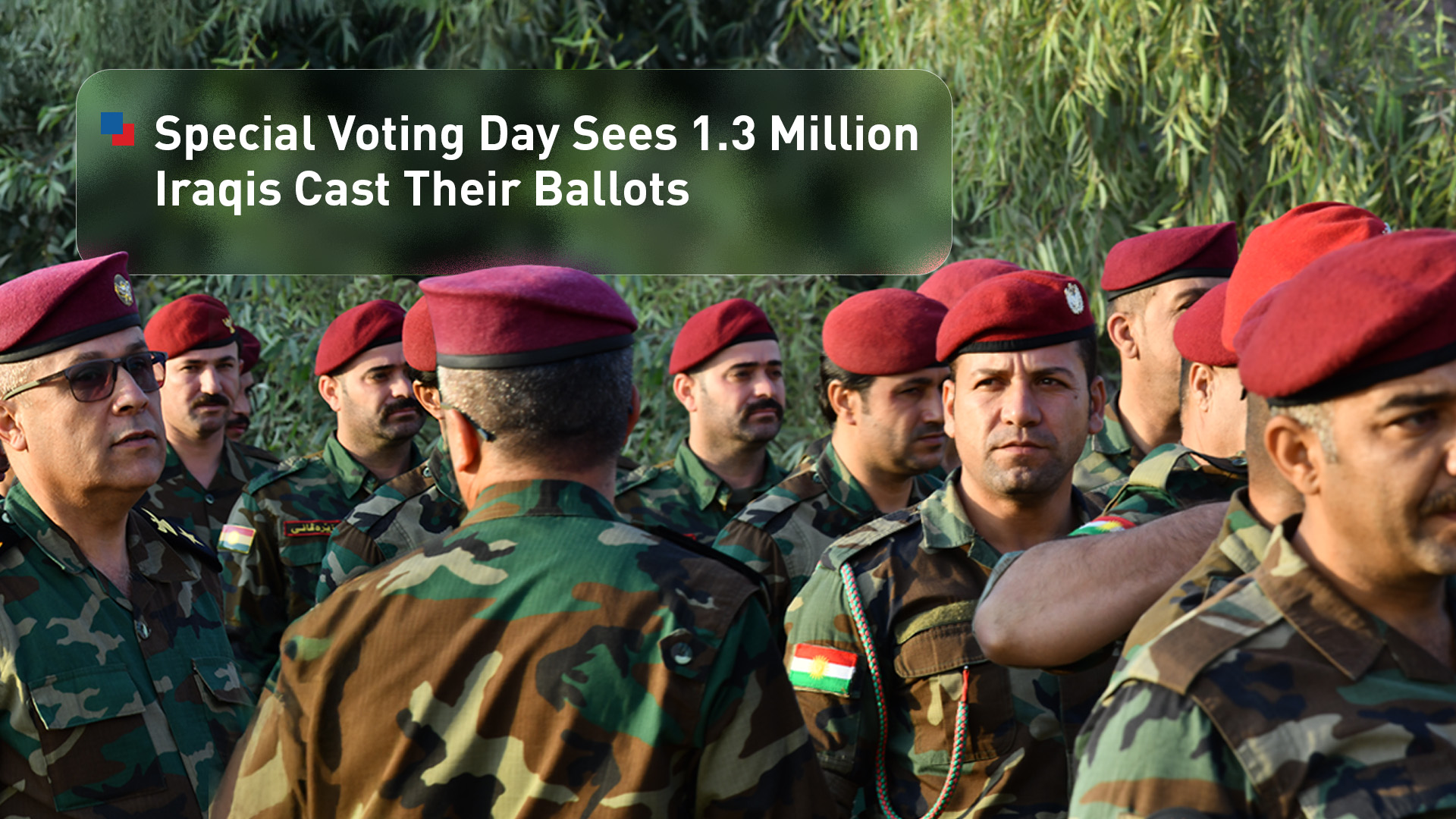Special Voting Underway as Over 1.3 Million Security and Displaced Iraqis Cast Ballots
Special voting for Iraq's parliamentary elections has begun, with over 1.3 million security forces and displaced persons casting their ballots across the country.

ERBIL (Kurdistan24) – The first crucial phase of Iraq's sixth parliamentary elections commenced this morning as polling stations across the nation, including the Kurdistan Region, opened their doors for a massive special voting process.
At precisely 7:00 AM on Sunday, November 9, 2025, more than 1.3 million members of the country's security forces and thousands of internally displaced persons began casting their ballots, a disciplined and essential prelude to the general election that will determine the composition of the next Iraqi Council of Representatives.
This large-scale logistical operation allows for the participation of those whose professional duties would prevent them from voting on the main election day. According to the latest information, more than one million, 313 thousand members of the security forces and employees of the Ministry of Interior in both federal Iraq and the Kurdistan Region are eligible to vote.
They are joined by over 26,000 displaced individuals, the majority of whom are currently residing within the borders of Duhok province in the Kurdistan Region, a poignant reminder of the demographic shifts caused by years of conflict.
To accommodate this significant electorate, the Independent High Electoral Commission of Iraq (IHEC) has designated 809 specialized centers across the country. The voting process is expected to continue uninterrupted until 6:00 PM this evening.
According to strict instructions from the commission, the ballot boxes will be closed electronically at the designated time, and the voting period cannot be extended, ensuring a tightly controlled and transparent process.
Following Sunday's special vote, the nation will prepare for the main event, when the general public will head to the polls on Tuesday, November 11, 2025.
This special voting day sets the stage for a monumental democratic undertaking. In a previous statement to Kurdistan24, IHEC spokesperson Jumana al-Ghalay outlined the sheer scale of the election. The race for seats in parliament is intensely competitive, with an initial pool of 7,744 candidates.
However, a rigorous vetting process has already thinned the field, with al-Ghalay confirming that 848 candidates have been excluded from the race for various reasons, leaving thousands still to compete for the trust of the electorate.
The intricate political and demographic tapestry of Iraq is vividly illustrated in the electoral data for each of its 18 provinces.
The capital, Baghdad, serves as the primary electoral battleground, holding the largest number of seats and attracting the fiercest competition. With 71 parliamentary seats at stake—including a 17-seat quota for women and five for ethnic and religious components—the capital has drawn a staggering 2,299 candidates.
This crowded field is navigating a fragmented political landscape of 12 alliances, 16 parties, and 21 individual lists. Baghdad’s 4,589,502 eligible voters represent the largest bloc in the country, with 274,636 of them participating in today’s special vote.
In the Kurdistan Region, the electoral dynamics are being closely watched. Erbil Province is competing for 16 seats, four of which are reserved for women and one for a Christian representative. A total of 108 candidates are on the ballot, representing nine parties and six individual lists.
Of the province’s 1,087,880 total voters, 85,793 are members of the security forces casting their ballots today. Sulaimani Province holds 18 seats, the most in the Region, including a five-seat women's quota.
The race there involves 136 candidates and a total electorate of 1,201,658, with 82,547 participating in the special vote. Duhok Province, which is vying for 12 seats, highlights the ongoing issue of displacement; in addition to its 55,993 special voters from the security forces, it is hosting the majority of the country's displaced voters, with 25,986 registered to cast their ballots in dedicated centers.
The contested and ethnically diverse provinces of Nineveh and Kirkuk are also key arenas. Nineveh, with 34 seats—including seven reserved for its diverse component communities—has the second-highest number of candidates after Baghdad, with 1,047 contenders.
The province has a large special voting contingent of 106,803, in addition to 26,447 displaced voters. Kirkuk, another politically sensitive province, is competing for 12 seats, with 251 candidates on the ballot and 61,062 voters taking part in today's process.
Across Iraq, the numbers tell a story of a vibrant, if complex, democratic process. In Anbar, 253 candidates are competing for 15 seats. In the southern oil hub of Basra, 571 candidates are vying for 25 seats. The holy cities of Karbala and Najaf are competing for 11 and 12 seats, respectively.
This nationwide exercise, beginning with the orderly and secure special voting of the nation’s protectors and its most vulnerable citizens, represents the first concrete step in shaping Iraq's political future for the next four years.